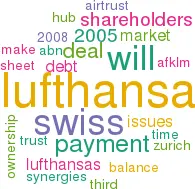Lufthansa/swiss: clever structuring
April 2005


Lufthansa has announced the initial details of its acquisition of swiss. ABN Amro has reported that despite fears that the market might be concerned about certain aspects of the transaction, the deal appears to be cleverly constructed. A Swiss trust (AirTrust) is to be established by the existing major shareholders of swiss. At the time of writing, swiss’s large shareholders had sold almost 84% of the carrier’s capital to AirTrust, this is almost all of the 86% previously held by large shareholders such as the canton of Zurich, banks Credit Suisse and UBS and the car import and dealership group AMAG. In May 2005, the trust is to make an offer to the 15% free–float shareholders of swiss for a price of €45m (CHF71m). After this transaction, Lufthansa will own 11% of the trust.
Upon receipt of the anti–trust authority approval of the deal, expected in the third quarter of 2005, Lufthansa’s ownership will rise to 49%, without further payment. The Swiss government plans to negotiate with bilateral partners around the world to secure the traffic rights of swiss under full Lufthansa ownership.
Once this is achieved for key trading partners (especially in the US and Japan), Lufthansa’s ownership of AirTrust will increase to 100%. At this time, Lufthansa will fully consolidate swiss, including its €400m on balance sheet and €500m off balance sheet debt. The timing of this process is uncertain, but some time in 2006 looks possible.
Lufthansa’s payment to the core shareholders is to take place three years from signing of the deal in 2008. Payment will vary depending on the share performance of Lufthansa relative to a basket of BA, AF–KL and Iberia. If Lufthansa under–performs the basket, then payment is zero.
If Lufthansa outperforms by 50% or more, payment maxes out at €252m. On the basis of derivative analysis, Lufthansa said it will make a non–cash provision of €30m–50m for this payment.
Lufthansa has made no legally binding assurances on the future of swiss, but has committed to develop swiss and the Zurich hub, provided it can be economically viable.
In its announcement, Lufthansa did not elaborate on the strategic rationale for the deal.
The deal could moderate competition on long–haul routes. Lufthansa looks set to critically grow its market share of Swiss–originating premium traffic on routes where there is a non–stop form flight from Zurich. Lufthansa should benefit from a monopoly situation in the Germany–Switzerland market.
Lufthansa pointed to synergies of €160m a year through to 2008, but admitted that integration costs would exceed synergies in 2005. As with the AF–KLM merger, synergies appear modest but come on top of the existing restructuring plan at the acquired company. On the basis of initial remarks, ABN Amro expects the market to reduce earnings estimates for 2005, roughly flat to slightly up for 2006 and up in 2007 and 2008.
Debt should only be modestly impacted by the €45m cash payment in 2005, but will increase more significantly once swiss’s €400m and €500m on and off balance sheet debt is fully consolidated, respectively.
Some issues
ABN Amro’s report highlights the following issues that raise some concern:
- More debt — Lufthansa’s rights issue proceeds, ostensibly raised to pay for A380s, A340s or reduce risk, were actually used to buy swiss.
- Management distraction — Lufthansa has not yet succeeded in fixing LSG or Thomas Cook.
Its own restructuring plan remains behind schedule. It is making progress on these issues, but is not there yet.
- Labour — Lufthansa and swiss will dance the same delicate steps seeking to keep the industrial relations issues at the two companies separate.
They will face the same challenge that AFKLM faced of continuing to force employees to accept the change despite its existence now appearing more secure.
- The network strategy is far from clear. The networks overlap directly — there are not the complementarities that AF–KLM illustrated. Lufthansa already has a dual hub structure, and so adding a third will make it difficult to define hub roles.
We see no major regulatory problems, though the Swiss government will not have the benefit of clear European Commission support should any third country oppose the deal.